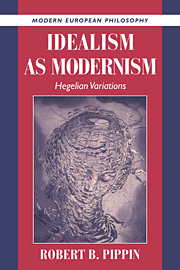Book contents
- Frontmatter
- Contents
- Acknowledgments
- Abbreviations
- Dedication
- 1 Introduction: Hegelianism?
- Part One The Original Options: Kant Versus Hegel
- Part Two Critical Modernism
- Part Three Greeks, Germans, and Moderns
- Part Four Narrating Modernity
- 10 Blumenberg and the Modernity Problem]
- 11 Modern Mythic Meaning: Blumenberg Contra Nietzsche
- Part Five Modernism and Nihilism
- Part Six Heidegger's “Cuhnination”
- Part Seven Hegelianism
- Name Index
- Subject Index
11 - Modern Mythic Meaning: Blumenberg Contra Nietzsche
Published online by Cambridge University Press: 05 June 2012
- Frontmatter
- Contents
- Acknowledgments
- Abbreviations
- Dedication
- 1 Introduction: Hegelianism?
- Part One The Original Options: Kant Versus Hegel
- Part Two Critical Modernism
- Part Three Greeks, Germans, and Moderns
- Part Four Narrating Modernity
- 10 Blumenberg and the Modernity Problem]
- 11 Modern Mythic Meaning: Blumenberg Contra Nietzsche
- Part Five Modernism and Nihilism
- Part Six Heidegger's “Cuhnination”
- Part Seven Hegelianism
- Name Index
- Subject Index
Summary
Nothing surprised the promoters of the Enlightenment more, and left them standing more incredulously before the failure of what they thought were their ultimate exertions, than the survival of the contemptible old stories – the continuation of work on myth.
Hans Blumenberg, Work on Myth, p. 274Burkhardt relates an “incomparably remarkable story” in Apollodorus. The story helps represent the peculiar powers and limitations of Zeus, and so might be said to be typical of “mythic thought” in general. It represents Zeus as “just powerful enough to help fate, which has gotten totally muddled, on account of two animals, to escape from its dilemmas” (143). The Theban fox was fated never to be caught, whereas the Athenian hound was fated to catch everything that he pursued. Were such a world to be possible, were two such creatures possibly to meet, a great threat to any worldly “significance” would have to be entertained; no logos for or reliable judge of the world would be conceivable (let us say). One can at least imagine the importance attached to excluding or somehow confronting such a possibility. One can also imagine the energies that might be expended in the Talmudic or Scholastic traditions on such a problem; the energies that were expended on problems like omnipotence and omniscience. Zeus “solves” the problem differently. He turns both to stone.
- Type
- Chapter
- Information
- Idealism as ModernismHegelian Variations, pp. 286 - 308Publisher: Cambridge University PressPrint publication year: 1997



